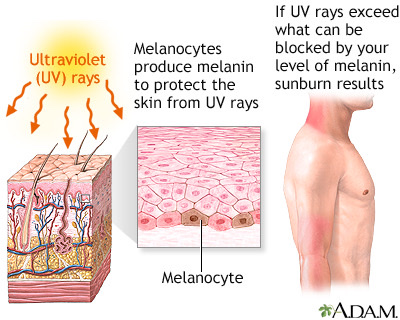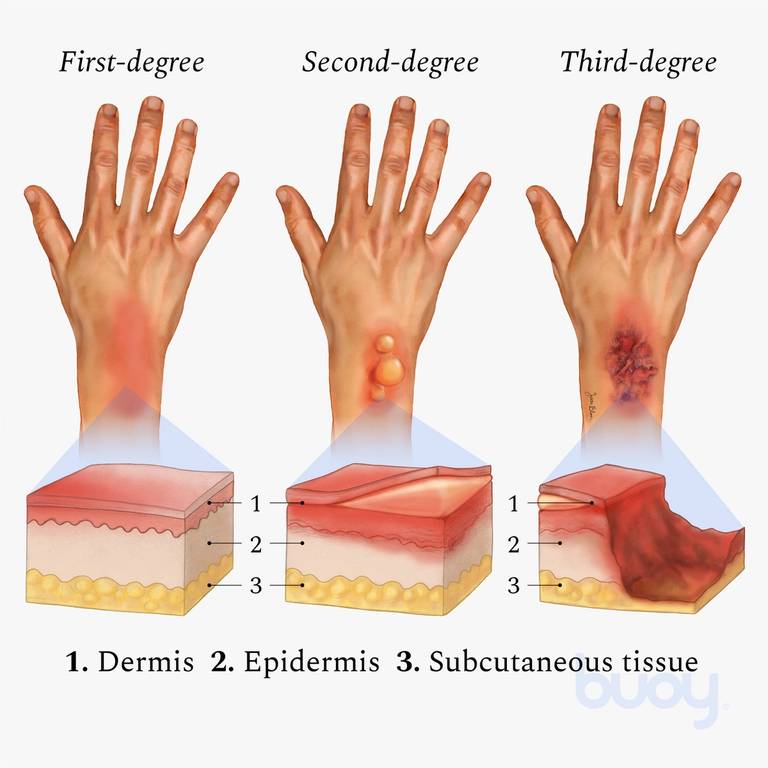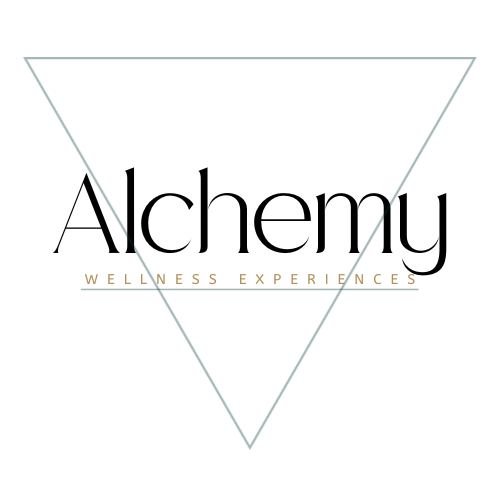You might have forgotten to reapply SPF or spent too long in the sun, and now your skin is irritated, red, and you’ve ended up with a sunburn.
While it’s not ideal, it happens! In this article, I’ll share what happens when you get a sunburn, a few things you can do to ease the symptoms, and what you should avoid doing to prevent these burns from causing maximum lasting damage to your skin.
What is a Sunburn?
Simply put, a sunburn is a burn from radiation exposure to the skin.
For a more technical definition…Sunburn is a visible reaction of the skin’s exposure to ultraviolet (UV) radiation (Invisible rays that are part of sunlight) or UV light sources, such as tanning salons. When the amount of exposure exceeds the ability of the Melanin (the skin’s protective coloring or pigment) to protect the skin, a sunburn occurs. This can happen in as little as 10 minutes in very light-skinned people. For darker skin tones, it can take several hours of the same exposure.

What are some symptoms of sunburn?
Redness
Pain
Heat radiating from the skin
Itching
Swelling
Fever
Chills
Blisters
Dry, Flaking, Peeling skin
Fatigue
Confusion or faintness

If you end up getting burnt, here are some do’s and dont’s
- Do take a cool shower or bath, or apply a cool compress to the area.
- Do seek medical attention for severe symptoms like nausea or vomiting, fever, confusion, or faintness.
- Do drink lots of water! Sunburns draw fluid to the skin’s surface and away from the rest of your body. Drinking extra water when sunburnt helps give your body what it needs to heal and prevent dehydration.
- Do keep the skin very well moisturized while it heals. Avoid products that contain “Fragrance” or “Parfum” in the ingredients; these are irritants.
- Do wear loose clothing. Take extra care to wear clothing that covers your skin if you should have to be outside.
DON’T:
- Don’t go back out into the sun. I know it’s incredibly tempting, especially if you’re on vacation and feel you must enjoy every last second of your trip. Further exposure increases the severity of the burn. Excessive/multiple sunburns can lead to the formation of skin cancer. Stay in the shade and wear protective clothing like a wide-brimmed hat and long sleeves/pants.
- Don’t pick any blisters or peel flaking skin. If your skin blisters and peels, you likely have second-degree burns, and these blisters protect your skin from infection. Do NOT pop them. Instead, dry bandage them and seek immediate medical attention.
- Don’t use Petroleum Jelly (vaseline) or other oil-based products. They can block sweat, toxins, and heat from escaping, leading to infection.
- Don’t drink alcohol. Alcohol is dehydrating and causes inflammation. Your body is already working to repair the sun damage; alcohol adds fuel to the fire. Quite literally!
- Don’t ice the area.
- Don’t use rough exfoliating skincare products while the skin is still red, inflamed, or has blisters.
- Don’t use skincare products containing Alpha Hydroxy Acids (AHAs), Retinoids, Beta Hydroxy Acids (BHAs), or other active skincare ingredients. Discuss your homecare routine with your esthetician to determine if you have any products that would make you more sun-sensitive before sun exposure.
A few other items to note:
- There is no such thing as a “healthy tan.” Unprotected sun exposure causes premature aging and skin cancer. The outdated thought process of getting a “base tan” or base burn” in the beginning of summer as a protective measure is extremely harmful to your long-term health.
- Sun Exposure causes both first and second-degree burns. It’s rare, but third-degree burns are also possible.
- Skin Cancer is usually diagnosed in adulthood but is caused by sun exposure and sunburns beginning as early as childhood.
- While darker skin tones are less likely to burn and have more protection, they are still at risk of developing skin cancer. Late detection makes diagnosed cases much more dangerous. Everyone regardless of the shade of their skin should take protective measures.
Prevention is key!
- Know what the UV index is and avoid being outdoors in direct sunlight when the UV index is high (it is usually at its highest between the hours of 10 am and 2 pm).
- Wear protective clothing such as long sleeves and a wide brim hat to protect sensitive skin often forgotten, like the back of the neck and ears.
- Apply the correct amount of SPF. *Fun Esti Tip* squeeze the tube of SPF down the length of two of your fingers. This is enough for your face. Four fingers worth for your face, neck, and chest. About a shot glass full is sufficient for full body coverage. Don’t forget to reapply! Even if you aren’t being active or swimming, you still need to reapply throughout the day. You can shop my favorite SPF products on my Sun Protection page.
Some emergency repair products (for mild sunburns) that I recommend to soothe irritated skin are:
For its ability to soothe and rehydrate the skin. Its specific formulation is designed to prevent water loss, help irritation, reduce redness and encourage healing.
For its excellence in treating traumatized skin, abrasions, and burns.
Roccoco Botanicals Intense CPR
For its anti-inflammatory, soothing, hydrating properties. It has a no-sting formula that is also great for use on little ones!
Once the redness has subsided, the Image Vital C Hydrating Enzyme Mask works well to digest dead, flaking skin while adding hydration and providing antioxidants to neutralize free-radical damage.
Finally, the sun is the most potent cause of premature aging. Damage caused by sun exposure leads to rough texture, uneven skin tone, increased acne, formation of hyperpigmentation (excess production of melanin in the skin as a result of sun damage), and, in some cases, hypopigmentation (loss of skin color as a result of trauma to the skin), loose sagging skin, fine lines, and wrinkles. Vitamins C and E are excellent at combating and limiting damage.
Here are a few of my top-selling serums for battling premature aging:
Roccoco Botanicals Cellular Defence Serum
Roccoco Botanicals Skin Brightening C Serum
DMK Direct Delivery Vitamin C Serum
Image SkincareVITAL C hydrating antioxidant A C E serum
Helping you protect your skin and stay healthy is my top priority. If you would like to book a consultation to get more information on Sun-Safe best practices or help to find the best products for you, in-person or online consultations are available.
